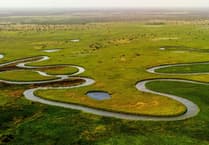Four Devon MPs, Caroline Voaden (South Devon), Ian Roome (North Devon), Richard Foord (Honiton and Sidmouth) and Steve Darling (Torbay), along with 187 MPs, are supporting the Climate and Nature Bill. However, to progress the Bill, at least 102 MPs must attend the House of Commons and vote for it at its second reading on 24 January 2025.
By passing the Climate and Nature Bill, the government would be making a legally binding commitment to tackle the nature crisis and climate change together and in line with the most up-to-date science.
Previous governments have already pledged, alongside 196 other nations, to limit global warming to 1.5°C and halt and reverse nature loss by 2030. But at present, these targets are not legally binding, and our existing legislation is not robust enough to ensure they are met.
The UK Office for Environmental Protection (OEP) reports that nature in the UK is continuing to decline with many ecosystems close to tipping points. Some key causes of degradation are local to Devon, including seabed trawling that is destroying the fragile marine ecosystem, and the pollution of rivers with fertilisers, livestock manure and sewage.
We cannot afford another decade of inaction. Years of research by scientists at the Potsdam Institute have identified nine systems, that they call the planetary boundaries, that regulate the stability and resilience of the Earth’s life-support functions that ensure the future liveability of the planet.
Every year, scientists assess the status of these boundaries, in a kind of planetary health check. They warn that the Earth may have already breached seven of the nine planetary boundaries. Crossing these boundaries means that these natural processes can no longer properly function, increasing the risk of sudden changes in the environment and threats to human wellbeing.
The loss and degradation of forests, wetlands, peat bogs and other natural landscapes that are needed to sustain rainfall patterns, provide habitats for wildlife and to store carbon, are accelerating both climate change and the decline in the diversity, abundance and health of living plants and animals which has already exceeded safe levels.
Restoring nature is essential to stabilising the climate as healthy forests, oceans, peat bogs, wetlands and sea grass meadows absorb vast quantities of CO2 from the atmosphere.
Another distinctive feature of the Climate and Nature Bill is that a representative sample of the population, chosen at random, will form a Climate and Nature Assembly, to hear advice from experts, deliberate together, and make recommendations on measures to implement the government strategy.
The National Trust, WI, CPRE, Friends of the Earth, Greenpeace, the Wildlife Trusts and many other organisations and businesses are supporting the Bill. The Climate and Nature Bill can be found at www.zerohour.uk
-Richard-Foord-(Top-Left)-Ian-Roome-(Bottom-r.png?width=752&height=500&crop=752:500)




Comments
This article has no comments yet. Be the first to leave a comment.